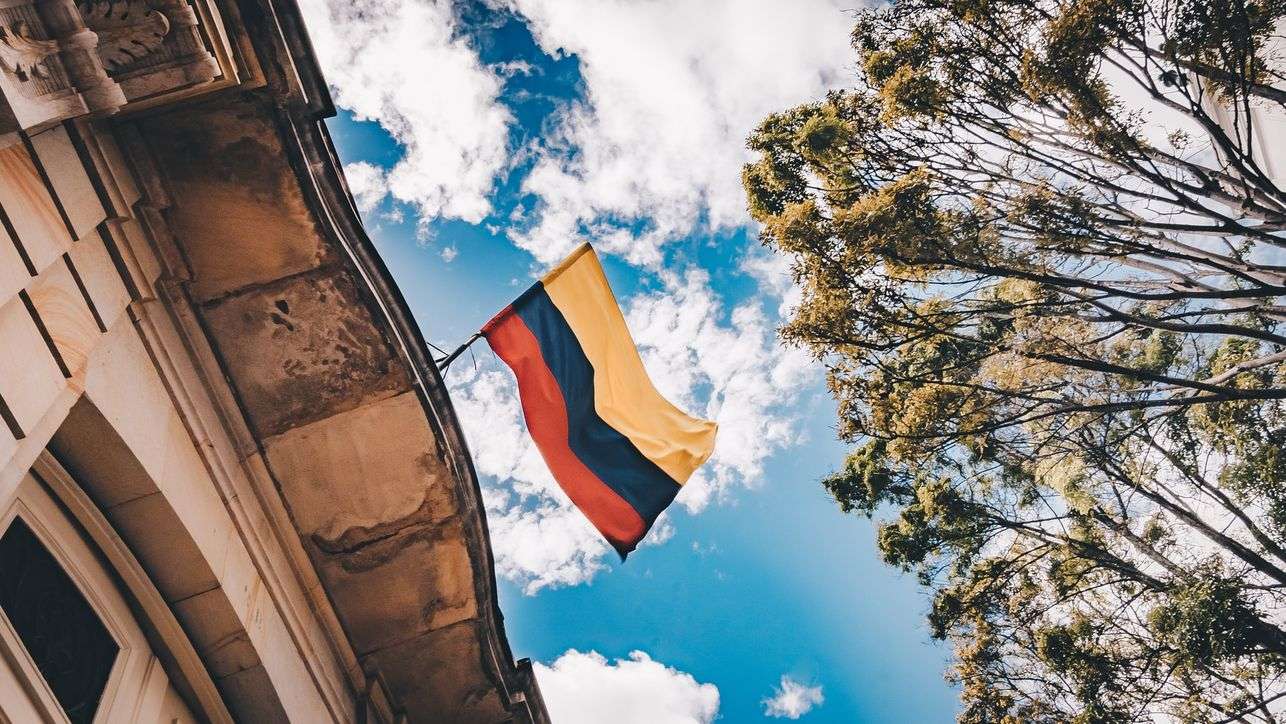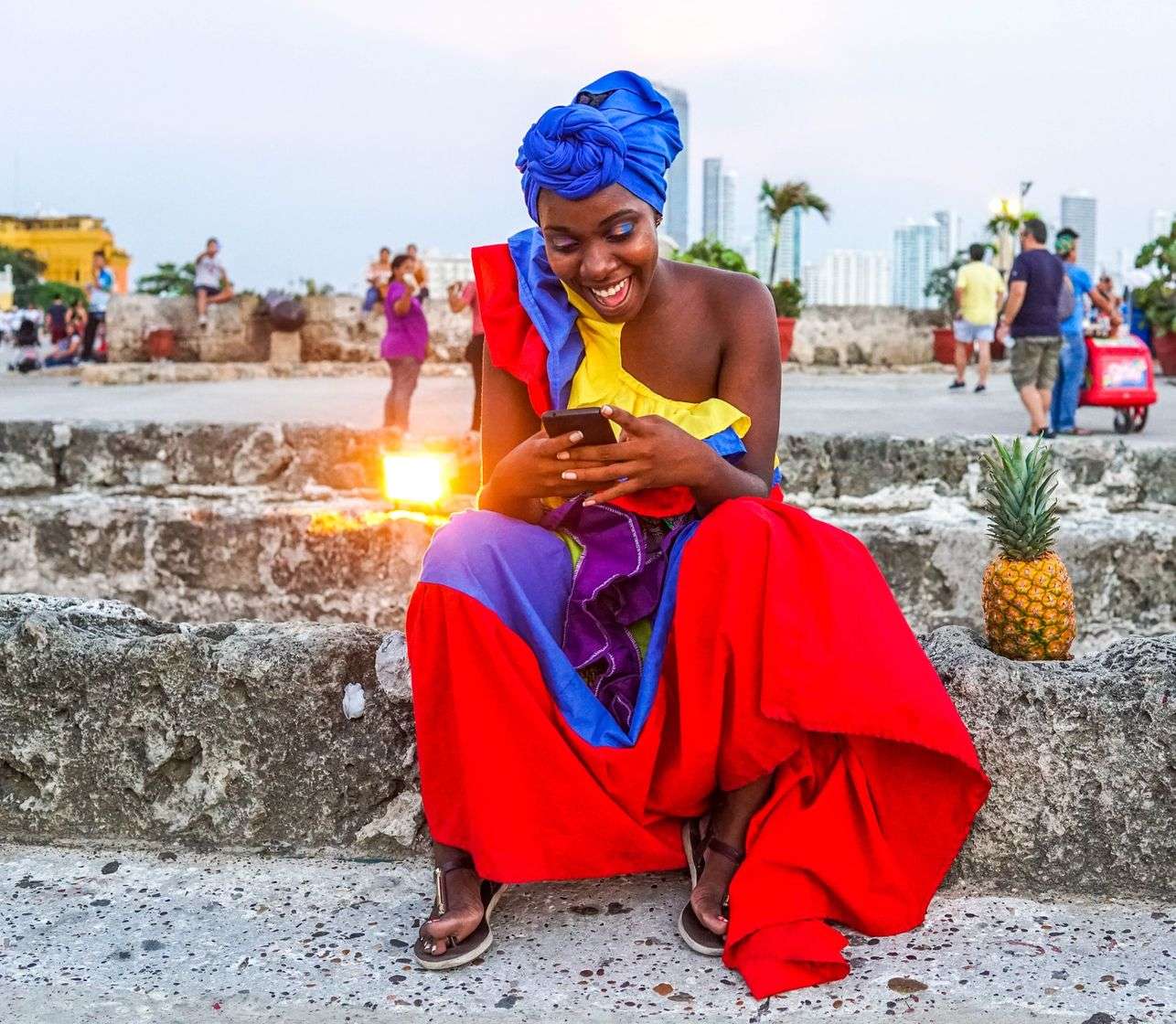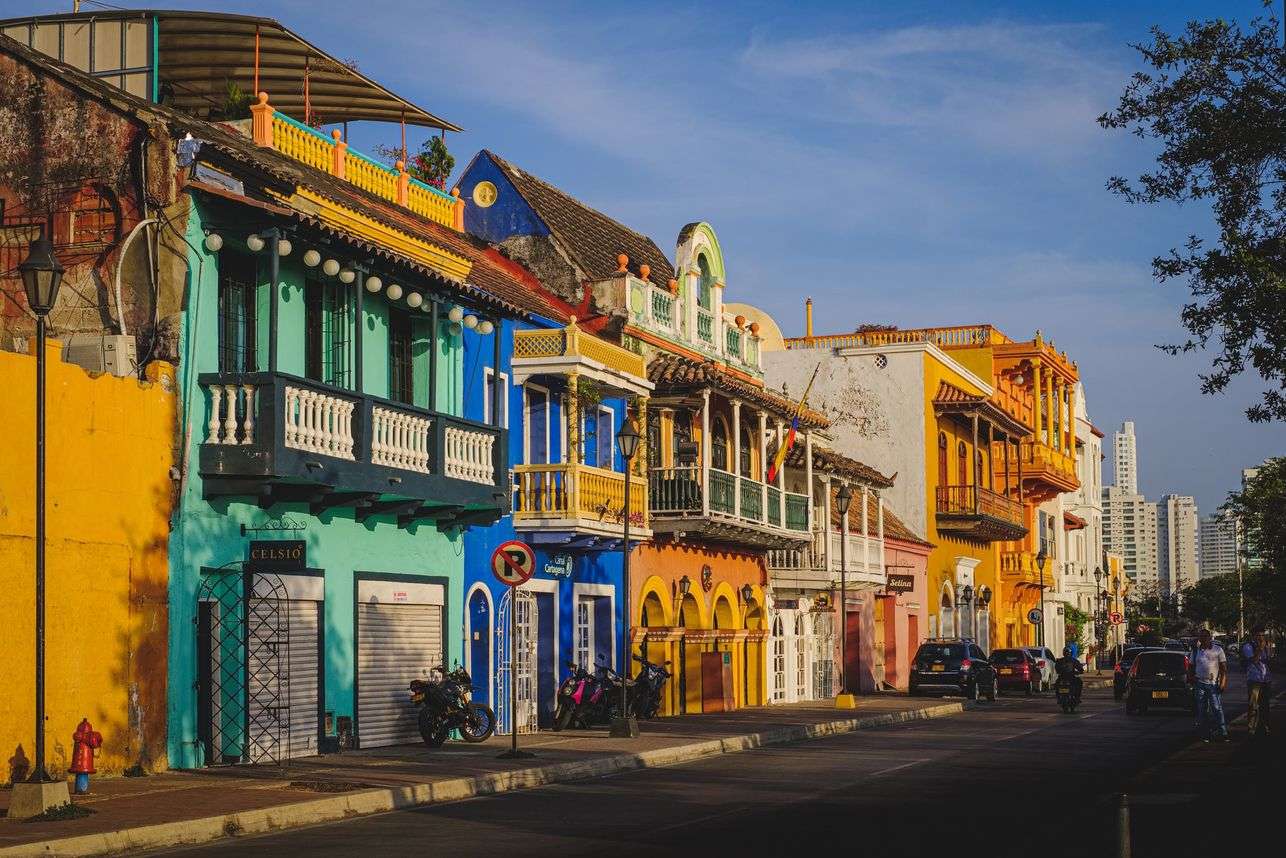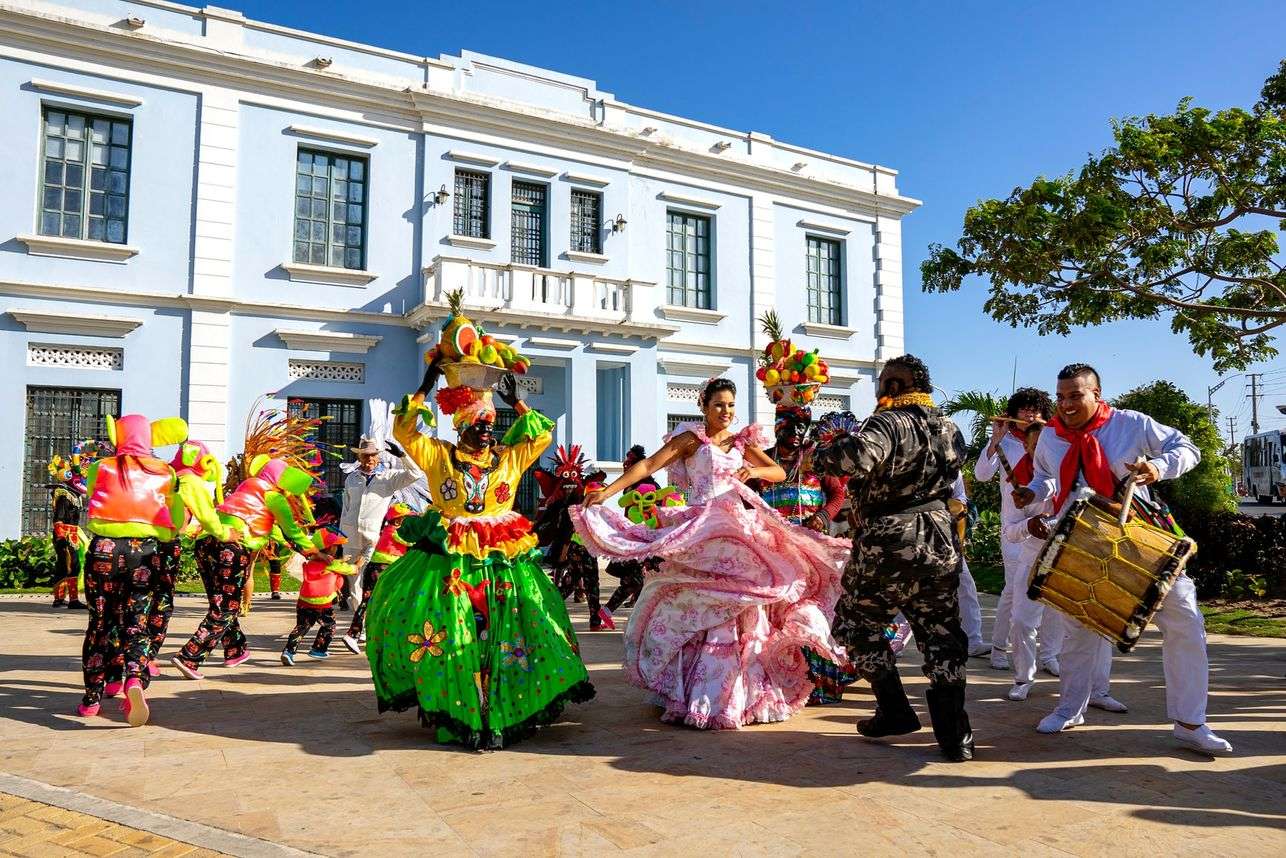
Colombian Slang: How to Sound like a True Parcero
DATE:
Colombian Spanish is one of the most vibrant and colorful dialects in Latin America.
This blog introduces you to some unique Colombian slang, reflecting the country’s rich culture. Colombia is a beautiful country with cool weather in Bogotá and stunning beaches on the Pacific and Caribbean coasts. The people are warm and friendly, eager to share their culture with visitors.
While Colombian Spanish is often considered the most neutral and clean, the dialect varies across regions, particularly in intonation and articulation. Grab a cup of Colombian coffee and explore the diverse and rich jargon of Colombian Spanish with us.
Colombian Slang words to refer to people
1. Vecino/Vecina
In Colombian slang, everyone is your neighbor. The meaning is actually the same if you translate it as neighbors in towns usually have close friendships.
However, you don’t call your friends like this. The word nicely greets people into your store or when you come to a stranger’s house to ask for something.
By the way, use “veci” to shorten the word and sound even more friendly.
- ¡Adelante veci! ¿En qué le puedo ayudar?: Come in sir/ma’am. What can I do for you?
2. Parcero/Parcera
Now, we start with some real Colombian slang! You can basically use this word with everyone but you really mean it if you use it with your close friends. Otherwise, when employed with strangers is about creating a connection with a possible client or benefactor.
So, Colombians use it as a way to say mate, bro, bud, pal, friend, etc.
Meaning for possible clients in street markets:
- Parcero, venga, estamos a la orden: Mate, come here, how can I help you?
Meaning for friends:
- Parcero, lo espero en la plaza: Bro, I’ll wait for you at the square.
Isn’t this Spanish word too long? Of course, that’s why they say “parce”.
- Oiga, parce. Nos vamos, ¿o qué?: Hey, dude. Are we going or what?
3. Llave/Llavero
Colombian Spanish words that literally mean key and key chain, respectively. These slang words are not used by everyone because they are also considered low class. These are used to describe a close friend or a group of friends.
Young people would use these terms to sound cooler or that’s what they think.
- Venga llave, ayúdeme a empujar el carro: Please, dude, help me push the car.
- Ese ya no está en mi llavero: That one is no longer my friend.
4. Chino/China
If you’ve been to Colombia, you’d know they don’t talk about nationality as it would be in English. Well, native speakers from outside of Colombia would also think they refer to the nationality.
It’s actually used for children and friends.
- ¿Qué hubo chino? ¿Nos vemos o qué?: What’s up man? Are we meeting?
However, if someone says “chinazo”, it’s because that person is talking to a cool guy.
- Venga chinazo y le cuento: Come bro, I have to tell you something.
5. Man/Vieja
In Colombian slang, you don’t call people “hombre” or “mujer”. They “colombianized” the word “man” with their intonation so it’s used to refer to a guy and, on the other hand, an old woman which is “vieja” is used to refer to girls or women.
However, when a woman is actually old, don’t call her “vieja”. That’s rude! Use “abuelita” instead.
- Ese man se ve raro: That guy looks weird.
- La vieja esa ni me miró: The girl didn’t even look at me.
6. Sapo/Sapa
The whole meaning of sapo is meant for those people you don’t like but who are trying to listen to your conversations or with those who gave you away to the police or the authorities.
In Spanish, sapo is not actually vulgar but it’s among the slang words and phrases in Colombia that are employed to show your anger and sapo is, of course, pretty rude.
- Este gonorrea es muy sapo, ábrase: This sucker is a snitch, get lost!
7. Perro
In Colombia, it’s used to call friends or foes with a slight difference. Something like everything we have covered during this Spanish slang course.
Spanish-speaking folks in Colombia will give you the diminutive if you’re a friend:
- ¡Estoy a la orden perrito!: Whatever you need bro!
But, the original Spanish word means you’re not a friend:
- Oiga, perro, ¿su mamá sabe coser?: Hey, you. Does your mom know how to sew?
The previous expression is a popular Colombian warning. It means you need to stop what you’re doing or you’re getting stabbed. If you ever listen to this, don’t say yes, just walk away.
8. Marica
This Spanish term is very common and it’s not that complicated to understand.
Meaning coward:
- ¡No sea marica y salte!: Don’t be a pussy and jump!
Meaning gay:
- Ese viejo es como marica: That man is gay.

Colombian slang words used to describe food and drinking
1. Deli
It may not be considered to be among the slang words used in Colombia but you will certainly get lost if you listen to it with little context.
It is not short for “delicatessen” but for “delicioso” when you are talking about food. If you use it twice, you are saying you loved it.
- La sopa estaba deli deli: The soup was delicious.
2. Guaro
Among slang terms you should be using in Spanish when visiting Colombia, this is an important one.
Used to describe strong and cheap alcohol also called aguardiente. This is what you drink when you want to get wasted quickly.
- ¡Hágale al guaro! ¿Tiene miedo?: Have some hooch! Are you scared?
3. Estar prendido
It literally means to be lit in English but it’s just a way to say that you’re drunk. In the Spanish-speaking world, the expression is very common.
- Me voy a la casa, estoy prendido: I’m going home, I’m drunk.
Colombian Slang words used to describe things, moods and situations

1. El Parche/Desparchado
Slang terms in Spanish for your group of friends and boring respectively. Once in Colombia, you’ll know how often these words are mentioned. It’s like breathing!
Parche is what you call the group of people you hang out with and you can say you are “parchando”. Remember, this one is only for Colombian Spanish.
- Ando con el parche en el chuzo que le dije: I’m at the bar I told you about with the homies.
On the contrary, desparchado, is the word used if you’re bored.
- ¿Qué hace? ¿Está ocupado?: What are you doing? Are you busy?
- Nada, desparchado: Nope, nothing. I’m bored.
2. Vaina
Are you in the Paisa region and you’re looking for words but you just can’t find them? This word can be used as a way of saying almost anything by just slightly changing the intonation.
|
Greet with affection: |
¿Cómo está la vaina?: How’s it going? |
|
Demand for clarification: |
Acláreme una vaina: Explain yourself better |
|
Looking for a fight: |
¿Cuál es tu vaina?: What’s your problem? |
|
Something stinks |
¡Cómo huele esa vaina!: That stinks! |
|
Something smells delicious: |
¡Cómo huele esa vaina!: That smells good! |
|
Something good: |
¡Qué vaina tan buena!: That’s so good! |
|
Something that is not good: |
¡Qué vaina tan mala!: That sucks! |
|
Displeased due to some action: |
A mí no me vengas con vainas: Don’t bullshit me. |
|
To refer to a thing: |
Pásame esa vaina, por favor: Give me that, please. |
|
No way!: |
Ni de vaina. |
3. No Dar Papaya
It’s very common to hear this phrase when you put your bike on the sidewalk without a chain or you’re talking on the phone while walking on the street. It’s meant to be a warning so, when someone says this, be careful, Colombians know what they’re saying.
Papaya, although it’s also used to talk about the fruit, it means easy as well. That means that dar papaya or “giving papaya” is you providing a very possible opportunity to be taken advantage of.
This one is pretty hard to translate.
- Guarde ese teléfono, no dé papaya: Put that phone away, you’re asking for it.
- Tengo mis papeles al día para no dar papaya: My papers are in order, I’m cautious.
4. Chimba
It says things are good, or bad. If you have to say something with this word in Colombia, listen first. Chimba could also be a synonym of chévere.
As an insult:
- ¿Qué le pasa, care chimba?: What’s your problem, dickface?
Meaning something really cool:
- Parce, ese man es una chimba de amigo: Dude, that guy is a good friend.
Meaning something really bad:
- Chimba de equipo tengo: My team sucks.
5. Bacano
If someone says bacano, know that it is related to a really cool situation or person in Spanish. A word English speakers learn really quickly is “chévere” which is a synonym.
The literal translation in the dictionary works this time (if the word is there, of course).
- Estaba bacano el toque, parcero: The party was great, dude.
6. Juicioso/Juiciosa
Describe people who perform their tasks without having the need to be told over and over. Also, for a person who behaves well. When someone says this in Colombia, it’s like giving you a warning. It means you have to behave or there will be consequences
- Juiciosos con la abuela, niños: Be nice to your grandma, kids.
7. ¡Qué pena!
In Colombia, the phrase “¡Qué pena!” translates literally to “what a pity,” but it commonly means feeling ashamed or embarrassed. Similar expressions include “trágame tierra,” which means “I want to die” out of shame.
In Colombia, “¡Qué pena!” is frequently used to say “I’m sorry!” or “Excuse me!” and often serves as a conversational filler when addressing strangers or seeking attention. In Bogotá, where politeness is prevalent, the phrase is frequently heard even in discussions.
- Qué pena con usted pero no pude llegar temprano: I’m sorry but I couldn’t arrive on time.
8. Me regalas…
People from other Spanish-speaking countries will ask for things differently from the way Colombians do it. So, when buying something, a Colombian would always ask for things as a gift but it’s not the case.
By the way, it is also very common for Colombians to use diminutives when asking for things or when someone offers you something. That is adding -ito/cito (for masculine) or -ita/cita (for feminine) at the end of the words so it sounds nicer (or so they say).
So, even if you ask for anything in a store or restaurant, don’t forget the diminutive!
- ¿Me puede regalar una botellita de agua?: Can I get a bottle of water?
- Una bebecita: A baby
- Un barquito: A boat
- Despacito: Slowly

9. Parar Bolas
The Colombian slang phrase “parar bolas” means “listen to me” and is used when someone is annoyed with your behavior. Its literal translation, “to stand balls” or “to stop balls,” is meaningless in English.
It’s impolite to use this phrase with people you owe respect to, such as teachers, strangers, or elders. Instead, use “présteme atención” to politely ask for their attention.
- Parce, páreme bolas que le estoy hablando: Dude, pay attention, I’m talking to you.
10. Harto/Harta
If something says you want more, that’s the slang word harto. In Colombia, the meaning is like “a lot of” when asking for something or just expressing a quantity.
- ¡Literal! hablar harto paisa con las chinas funciona una chimba para conquistar: It’s literal! speaking paisa with the girls works every time when flirting.
You’ll listen to this Spanish word every day. It’s curious that it is not commonly used in Colombia with its actual meaning which is “fed up”. Instead, Colombians would express that they can’t take it anymore with a variable of the word that doesn’t exist; “jarto” which also means you’ve drunk too much.
- Tengo harta plata para el viaje: I’ve got a lot of money for the trip.
- Le di duro al aguardiente, ya estoy jarto: I went hard on the booze, I already had too much.
11. Tusa
Slang term that exists only in Colombia or so it was until Karol G & Nicki Minaj’s song “Tusa” kicked in. If you look it up with English lyrics, you’ll find some good slang in context.
It means heartbreak and no other word in Colombia better say you’re having a bad time due to a hard breakup.
- Bebamos para matar la tusa, chimba de idea, literal: Drinking to mend broken hearts it’s never a good idea.
12. Gonorrea
It doesn’t actually have one meaning in English. Colombians employ the term to insult people and it is a very strong word for them.
- ¡Qué gonorrea! Perdimos: Fuck! We lost.
- ¿Qué me mira, gonorrea?: What are you looking at, motherfucker?
- Uish, no bote el aguardiente gonorrea: Hey, don’t spill the booze, asshole.
13. Berraco/Berraca
There are two ways in which you can use this slang term. Means someone is angry:
- Se emberracó cuando recibió la noticia: She got mad when she heard the news.
Meaning “hard situation”:
- Hay un sol del berraco: The sun is burning
14. ¡De Una!
Spanish slang means Sure! or Absolutely!
A short and happy Colombian way to accept invitations.
- ¿Quieres más pollo?: Do you want more chicken?
- ¡De una!: Sure!
Use what you learned!
Do you feel like you’re ready to start talking like a true parcero?
This list is just the start of the slang you can learn while you travel around Colombia. Go ahead, start learning some new expressions from our list and then watch some videos or speak to some natives to get used to the Colombian accent.
Each region has its own peculiarities, so the best way to get used to the accent is by jumping right into it! So go ahead and remember, if you’re looking for the support of an incredible teacher, we can help. Try a free private class or sign up for a 7-day free trial of our group classes so you can practice what you learned.
Remember that context matters and it’s very important to know exactly when to use what in the Spanish language to avoid misunderstandings and awkward moments. A word of advice, don’t use slang language freely, just do as people around you do.








